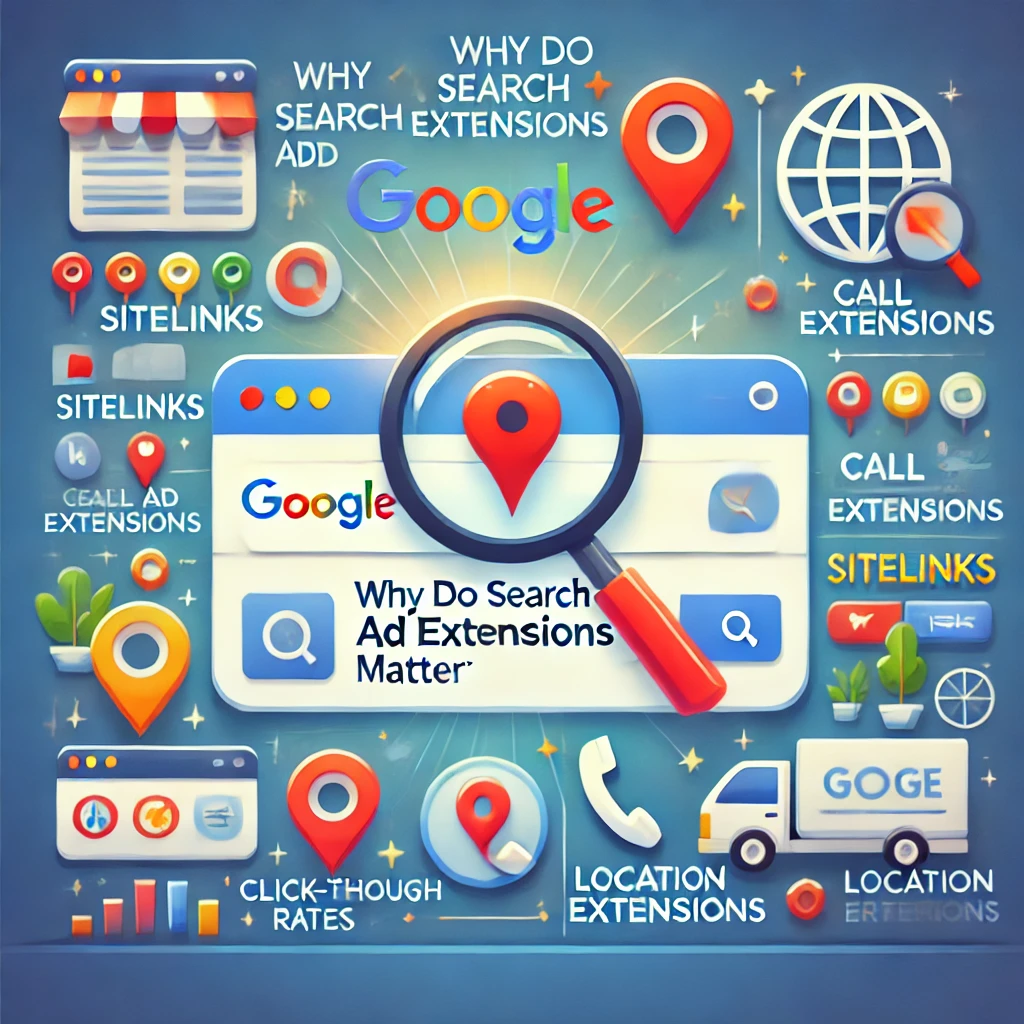Search ads are a powerful tool in digital marketing, allowing businesses to reach potential customers right when they are searching for relevant products or services. However, simply creating a search ad isn’t enough to maximize visibility and engagement. This is where ad extensions come in.
Ad extensions are additional pieces of information that can be added to your Google Ads beyond the basic ad text. They enhance your ad’s performance by making it more informative, engaging, and clickable. In this blog, we will dive deep into why search ad extensions matter, how they can improve your ad campaigns, and the types of ad extensions you can use.
What Are Search Ad Extensions?
Ad extensions are additional content provided within a search ad, giving users more information and options to interact with. These extensions can display extra links, phone numbers, location details, promotions, and much more. Rather than relying on a simple headline and description, ad extensions allow advertisers to give more details to potential customers in a quick and digestible way.
For example, when you search for a restaurant, you may see an ad that not only includes a link to the restaurant’s website but also provides options to call, get directions, or view the menu. These added features come from ad extensions.
Why Do Search Ad Extensions Matter?
1. Enhanced Visibility
One of the main reasons ad extensions matter is that they significantly increase the visibility of your ads. By adding extra information, your ad takes up more real estate on the search engine results page (SERP). More space often translates to higher visibility, which leads to better click-through rates (CTR) and, ultimately, improved ad performance.
2. Increased Click-Through Rate (CTR)
When your ad includes additional links, phone numbers, or product images, it becomes more attractive to users. The extra information provided by ad extensions is highly relevant to searchers, giving them more reasons to click on your ad. This not only improves your CTR but also increases your ad’s Quality Score—Google’s measure of your ad relevance and performance—which can lead to lower cost-per-click (CPC) rates.
3. Improved Ad Rank and Quality Score
Ad Rank is Google’s formula for determining where your ad will appear on the search results page. It considers factors like bid amount, ad relevance, and the expected impact of extensions and other ad formats. Using ad extensions can improve your Ad Rank without increasing your budget, as it enhances the user experience and shows Google that your ad provides more value.
Since Google rewards ads that offer a better user experience, using extensions can directly improve your Quality Score. This means that even if your competitors have higher bids, your ad could outrank them simply by being more informative and useful.
4. Better User Experience
Ad extensions make it easier for users to find the information they are looking for quickly. Whether they want to call your business, see a map of your location, or view a specific product, ad extensions give them the tools to engage more effectively. This improved user experience not only increases clicks but also helps convert those clicks into meaningful actions, such as purchases or inquiries.
5. Tailored to Specific Campaign Goals
Ad extensions can be customized to match specific campaign objectives. For instance, if the goal is to drive more calls to your business, a call extension allows users to dial your number directly from the ad. If you want to increase foot traffic, location extensions can show your business’s address, phone number, and a map, encouraging people to visit in person. This flexibility makes ad extensions an essential tool for achieving specific marketing outcomes.
Read More: Add Me to Search: Get Started
Types of Ad Extensions and Their Impact
1. Sitelink Extensions
Sitelink extensions allow you to add additional links to your ad, directing users to specific pages on your website. For example, if you’re a clothing retailer, you could include links to your men’s, women’s, and accessories sections. This helps users find exactly what they’re looking for and increases the likelihood of conversions.
2. Callout Extensions
Callout extensions allow you to highlight important selling points or unique offers, such as “Free Shipping” or “24/7 Customer Service.” These snippets appear under your main ad text and provide more information about your business, helping users make quicker decisions.
3. Location Extensions
Location extensions display your business’s address, phone number, and a map. This is particularly useful for local businesses looking to attract foot traffic. When users click on the address, they can get directions via Google Maps, which is convenient for those searching on mobile devices.
4. Call Extensions
Call extensions add a phone number to your ad, making it easy for users to call you directly from the search results. This is an effective way to increase phone inquiries, especially for service-based businesses like plumbers, doctors, or consultants.
5. Structured Snippet Extensions
Structured snippet extensions allow you to highlight specific aspects of your products or services, such as brands, product categories, or styles. This adds more context to your ad and helps users understand the range of offerings before clicking.
6. App Extensions
For businesses with mobile apps, app extensions allow users to directly download your app from the ad. This is highly beneficial for businesses that rely on mobile app engagement.
7. Price Extensions
Price extensions allow you to display the price of specific products or services, giving users a clear understanding of your offerings before they click on the ad. This can attract users who are price-sensitive and help pre-qualify clicks.
Benefits of Using Ad Extensions
- Higher Engagement: Ad extensions increase engagement by offering users more ways to interact with your business.
- Better ROI: The additional information provided by ad extensions leads to more qualified clicks, meaning users are more likely to convert.
- Customizable for Mobile Users: Many extensions, like call or location extensions, are particularly effective for mobile searches, where users are looking for quick, actionable information.
- More Control Over Ad Messaging: Extensions give you more space to showcase your brand’s value propositions, helping you stand out from competitors.
5 Frequently Asked Questions (FAQs) about Search Ad Extensions
1. Do ad extensions cost more?
No, ad extensions do not have an additional cost. You are only charged when someone clicks on your ad or interacts with the extension, such as clicking on a phone number in a call extension.
2. Do ad extensions always appear with my ad?
Not necessarily. Google decides when to show ad extensions based on the relevance of the search query, your Ad Rank, and available space on the SERP. If your extensions are highly relevant and improve user experience, they are more likely to appear.
3. Can I use multiple ad extensions at once?
Yes, you can use multiple ad extensions in the same ad campaign. In fact, it’s encouraged to use as many relevant extensions as possible to increase your ad’s visibility and effectiveness.
4. Do ad extensions impact Quality Score?
Yes, ad extensions can positively impact your Quality Score by improving the user experience and increasing your click-through rate. This can lead to higher ad rankings and lower CPCs.
5. Are ad extensions available for all types of businesses?
Yes, ad extensions are versatile and can be used by all types of businesses, whether you’re a local shop, an e-commerce platform, or a multinational corporation. Google provides various extensions to match different campaign goals, from driving sales to increasing app downloads.
Conclusion
Ad extensions are a vital component of any successful search ad campaign. They offer more visibility, improve user experience, and significantly boost CTR and ad performance. By using ad extensions, you not only provide more value to potential customers but also increase your chances of achieving your business goals, whether it’s generating leads, increasing sales, or driving foot traffic.






